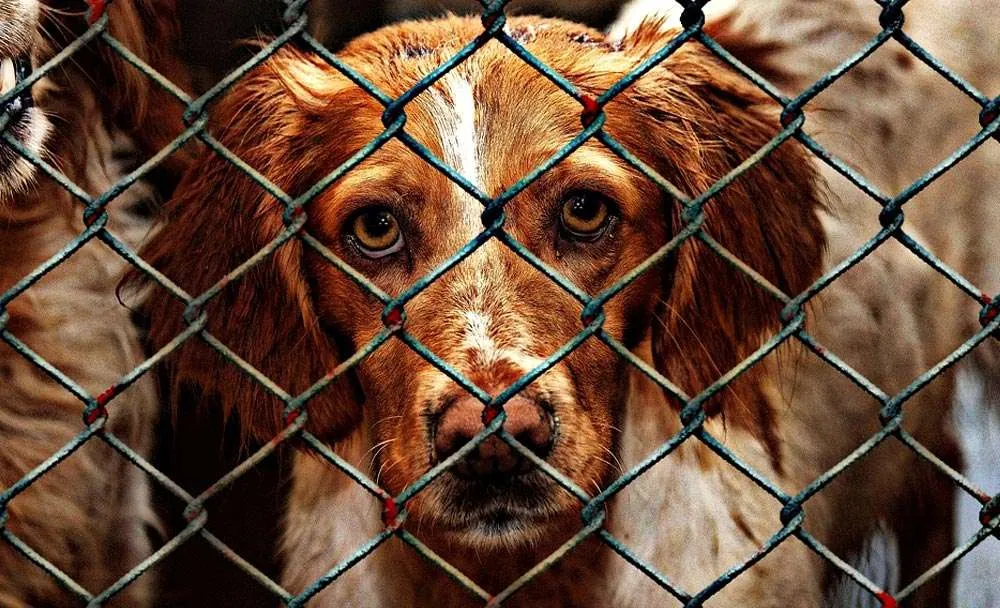It is not uncommon for a dog adoption to result in guilt and regrets; the dog you have so much looked forward to finally arrived in your house, but the experience that followed is not the one you have envisaged.
Maybe the Dog’s Behavior is driving you nuts because it’s not what you had in mind or not even close to that of your previous dog (assuming you previously had one).
Some dogs come with some annoying behaviors:
- Excessive barking
- Destroying shoes and items in the house
- Nipping and biting
- Not being friendly with other pets and humans at home
While it is natural to get overwhelmed when dog adoption results in anguish, there are things you can do to reverse the situation without guilt or regrets.
Why Dog Adoption ends in Regrets or Go Wrong
If you are reading this, it may be because you have become dissatisfied with your adopted dog, wondering what went wrong. Maybe you are even considering returning the dog to the shelter.
However, knowing why dog adoption usually turns out to be a wrong decision can be the pathway to dealing with your regrets.
When people with a new baby are unfamiliar with babies waking up at night and crying for no reason, they may think having a baby is wrong.
Let us talk about why dog adoption always becomes regrettable.
Lack of Knowledge about Dogs
Everyone that has ever engaged the service of a dog trainer always has one problem:
“I want my dog to do what I want. I want my dog to be able to follow my command.”
Some laments: “my once lovely dog suddenly changed; he won’t listen to me again.”
Most dog owners’ problems are that they fail to understand their dogs.
Not having adequate knowledge about your adopted dog will always result in unexpected and regrettable circumstances.
Dogs have evolved and have been living with humans for centuries. However, dogs don’t perceive the world the way humans do.
Misinterpreting Your Dog’s Behavior
How your dog sees the world is different from how you see it. Likewise, your dog learns and communicates differently.
For instance, let’s say you took your dog for a walk and are walking around the park. Your dog was getting different scents that your nose couldn’t detect, and he started to act in a particular way, like rolling on the ground.
What is the first thing that comes to mind when your dog rolls on the grass? You think he is scratching his back, which may be true at times, but your dog usually picks a scent in that area and loves to cover himself with the smell.
How is that for a misunderstanding? You have to see the world the way your dog sees it.
Not understanding dogs, in general, will always cause problems for the dog and the owner.
Sometimes we are remorseful about adopting the dog because we are not happy with the Dog’s Behavior.
We assume something is wrong with the dog while the dog is just being a dog, doing what is natural with dogs.
Inadequate Training for the Dog
Your adopted dog will make you miserable if you don’t train your dog well.
Not only will you regret adopting the dog, but the dog will also be miserable because you will both be unhappy.
Your dog needs training. Don’t assume dogs come trained and expect them to start behaving the way you want.
You need to give your adopted dog different training: from house to potty and obedient training; you have to train your dog for social interaction with other dogs and humans.
Dogs learn through conditioning; they attach pains and pleasure to specific cues they perceive from humans.
Dog’s Instinctive Behavior
No matter how much training you give your adopted dog, you will not change your dog from being a dog.
Some behaviors are phenotypical or natural to your dog; not understanding this will cause problems.
Dogs exhibit two common types of Behavior:
- Breed-Specific Behavior
- Age or Sex-Related Behavior
Breed-Specific
If you have a Border Collier, you will first notice that your dog is always chasing cars, sheep, skateboarders, or moving objects.
These dogs are raised for thousands of years as sheepdogs, used on farms to herd sheep.
What we call misbehavior in dog sometime is our dog exhibiting natural traits. If your adopted dog is a hunting dog, it will run after squirrels or birds in the park.
We have a Pomeranian / Jack Russell mix; we had some problems training him to be obedient.
He is constantly chasing birds in the yard and is very territorial. This Behavior is a trait peculiar to that breed.
Age or Sex-Related Dog Behavior
Before concluding something is wrong with your adopted dog, you must first consider if the Behavior is just because he is a puppy.
My dog always wanted to sleep beside me when he was a puppy; this changed with training and as he grew older.
Before giving up on your dog, you should consider your dog’s age.
Moreover, unneutered dogs tend to act in a certain way due to some hormones in their body.
Breed Confusion
Breed confusion is one of the reasons why many dog adoptions go wrong, and everything ends in regrets.
Most people literately adopt the wrong dog and have to return them to the shelter.
They are confused as to why their Husky, which they expect to be mouthy and howling, won’t even make a peep.
Moreover, they can’t understand why their Pitbull is nearly leaking visitors to death instead of being protective of the house.
This unexpected Behavior from the dogs usually happens when the breed has not been correctly identified.
Some dogs considered purebred are not what they look like, and the shelter staff has limited knowledge.
Physical Breed identification has often failed to ascertain the dog’s exact breed.
Trying to identify a dog breed by size, pattern, texture, and ears can be hit or mixed.
Some dogs can look entirely like one breed, but in reality, they look like a mix of certain species.
I always recommend checking the DNA of the Dog you are adopting to avoid a regrettable situation.
Background Check (Experience of the Dog)
Getting a dog from the shelter is similar to buying a used car. You don’t know what has happened to the dog before they end up in the dog shelter.
Without having adequate information about the dog’s past life and experience, you may end up being the one paying for what the previous owners have done.
Maybe the dog has suffered abuse or neglect.
The dog may not bond properly with you because he suffers separation anxiety due to being left by the previous owner.
Before you adopt a dog from the shelter, try to get as much background information as possible.
Knowing more about the dog’s background will prepare you to know how much work to do for your new dog.
How to Prevent a Dog Post-Adoption Regrets
You shouldn’t expect everything to go as planned when you adopt a dog from a shelter.
A dog ending up in the shelter first means something has gone wrong with the dog’s family life.
So adopting a shelter dog means taking a risk you may regret.
For instance, when you adopt a dog from the shelter, you might have to overcome a complex upbringing the dog may have had.
Also, the dog may have some bad habits that need retraining, and not knowing this will always result in regrets.
You are also taking risks for the dog’s health because you may not have all the details about the dog’s health.
What about the puppy years you must have missed? There is no way you are getting all that back.
Notwithstanding, you can still enjoy your adopted dog if you follow some steps.
Below are my suggestions:
Bring the dog home for a visit.
I always encourage people to bring the dog they intend to adopt home for a couple of days before they decide on adoption.
Spending a week with the dog will reveal what you are about to get into for a long time.
When you have the dog for a week, you will be able to study the dog’s temperance, Social Behavior, and so on.
You will learn how the dog can interact with children or other pets in the house.
Take the dog on a walk in your local park and see how he behaves among strangers and other dogs.
Get Professional Trainer.
A significant cause of regrets about adopting or owning a dog is when you have an untrained dog.
Dogs live in a different world.
Although these species have lived with humans for centuries and have adapted to living with humans, they still have their animal nature intact.
You must train your dog for them to interact correctly and meet up to your human expectations.
You must train the dog if you want an obedient dog to listen to your orders.
Return the dog to the shelter.
The main reason for adopting a dog is to have a pet in your life that is going to make you happy.
If you end up unhappy with the dog you are adopting, it is advisable to return the dog to the shelter.
There is nothing wrong with that.
People bring their dogs to the shelter for many reasons: a change in the owner’s circumstances, a change in the Dog’s Behavior, the experience of the owner, and so on.
Your adopted dog may find happiness with another family with better breed understanding, experience, and willingness to do whatever it takes to make the dog compatible with their situation.
Final Word
Dog adoption regrets can be avoided.
Someone brought Samoyed to the shelter because he got a job in a different part of the city.
She had to move into an apartment where dogs were not allowed.
Another family adopted the dog, and the dog is happy to run around in their big backyard without any problem.
While Samoyed can adapt to living in an apartment, this Dog is happier with a different family and new accommodation.
There is no guilt for the previous owner, whose work life has changed due to her job and relocation.
Returning the dog to the shelter may be good for you and the dog.
There should be no regrets after the dog adoption or feeling bad about returning the dog to the shelter.







